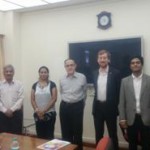22nd October 2014 Mumbai, India
Visit to TIFR
Last week I had a fantastic opportunity to visit one of India’s most renowned centres of excellence – Tata Institute of Fundamental Research (TIFR) Mumbai , along with my colleagues Tom Wells and Vijay Iyer. The TIFR is funded by the Government of India’s Department of Atomic Energy. Its main campus is located in Mumbai and has additional campuses located in Pune, Bangalore and Hyderabad. The TIFR’s main focus areas include basic research in physics, chemistry, biology, mathematics, computer science and science education. Located in South Mumbai in a picturesque campus adorned by the Arabian sea, this institute boasts of an interesting history. The country’s most respected and renowned scientist, Dr Homi Jehangir Bhabha, father of the Indian nuclear programme, was the institute’s founding director.
Here we met with the director of the institute, Professor Mustansir Barma, Professor E Krishnakumar from the Department of Nuclear and Atomic Physics and Professor Pandya from the School of Technology and Computer. During our brief conversation, it was interesting to learn of the various activities that the institute was involved in.
 This has not been my first interaction with the institute, though. I recall working with colleagues at the TIFR a few years back, to co-ordinate one of S&IN’s sponsored lecture series delivered by Professor Marcus Du Satoy, one of UK’s most eminent mathematicians. But every time I meet with new contacts here, I learn about something new that is brewing at the institute. For example, this time the director shared with us an exciting project of a new TIFR campus being built in Hyderabad.
This has not been my first interaction with the institute, though. I recall working with colleagues at the TIFR a few years back, to co-ordinate one of S&IN’s sponsored lecture series delivered by Professor Marcus Du Satoy, one of UK’s most eminent mathematicians. But every time I meet with new contacts here, I learn about something new that is brewing at the institute. For example, this time the director shared with us an exciting project of a new TIFR campus being built in Hyderabad.
Prompted perhaps mainly by the shortage of space available in the Mumbai campus, the upcoming institute in Hyderabad will house new research activities broadly covering all branches of sciences, mathematics and related areas. The new campus will also allow as an expansion of some of the current activities at the institute in new directions. Research in interdisciplinary areas between optical science, condensed matter physics and chemistry, and the life sciences will form the initial focus. Soft matter is an example of such an area. TIFR Mumbai has one of the strongest mathematical groups in the country. Applied Mathematics, very broadly will be one of the prime focus areas of the new campus in Hyderabad along with facilities for Intense Laser Fields.
At the molecular level, significant work is being undertaken by the Biological Sciences group in Mumbai. Research areas range from studies of depression and malaria, to molecular motors and how they move. There are good interactions with researchers at the National Centre for Biological Sciences located in Bangalore which is also part of the TIFR School of Natural Sciences.
Professor Pandya mentioned that TIFR Mumbai was part of the Centre for Formal Verification of Software, which is a collaborative partnership with IIT Mumbai and the Bhabha Atomic Research Centre. He was inspired by the work done by Professor Sir Tony Hoare’s team at the Department of Computer Science, Oxford University, who is a pioneer in this field.
Our meeting at the TIFR ended with a quick campus tour and a visit to a new chemistry lab being built within the premises, and headed by Dr Vivek Polshettiwar. He had been part of a recent workshop on biofuels in Durban, led by Vijay.
 Presently, there seems to be a couple of informal links between TIFR scientists and UK counterparts, but from our conversations I gathered there was a clear interest in building strong formal linkages with UK researchers. I am hoping to facilitate and foster such linkages. Please do get in touch with me if you’d like to connect with researchers at the TIFR Mumbai. Before we drove out of the campus, we took one last glimpse of the Arabian sea bordering the institute! One could never have a dull moment at this institute.
Presently, there seems to be a couple of informal links between TIFR scientists and UK counterparts, but from our conversations I gathered there was a clear interest in building strong formal linkages with UK researchers. I am hoping to facilitate and foster such linkages. Please do get in touch with me if you’d like to connect with researchers at the TIFR Mumbai. Before we drove out of the campus, we took one last glimpse of the Arabian sea bordering the institute! One could never have a dull moment at this institute.